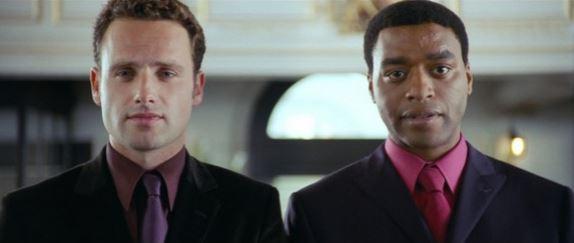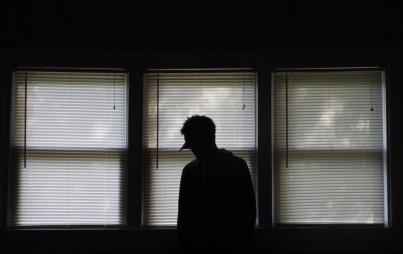Why are so many people madly in love with the Christmas-themed film Love Actually?
There’s definitely something special about this Richard Curtis film, hungrily consumed by millions every December, something different from any other Christmas movie, and even from most romantic comedies. I think I finally nailed what it is:
Male vulnerability.
The film is about how vulnerable it feels to be a man, in so many different ways. The joy we feel at the end of the movie isn’t just from the happy, love-filled ending (some of the stories’ endings are really not that happy), but also from the sense that these men who championed over pain, loss, heartbreak, shyness or loneliness actually won. And they won without compromising who they were or pretending they weren’t vulnerable, emotional guys.
There is one glaring exception to this rule, however, and it’s no surprise that it is the most maligned vignette in the film. I am of course talking about Colin Frissel, who is awkward and painful to watch, but never really vulnerable. He’s sort of rude, not because he’s socially inept, but rather because his sole objective throughout the film is to get laid by hot chicks. Because of that, he’s more suited for a movie like American Pie than this endearing classic. Maybe that’s why he goes to America to get laid. I don’t know, but I hate that storyline so I’m omitting it. Because this is my list, so I’m the boss!
So now that we’ve dismissed Colin (forget his storyline exists, that’s what I do every time I watch it), let’s get to the meat and bones of the amazing men in Love Actually.
Jamie, played by Colin Firth
Why we like him: When we meet him, he’s madly in love with a gorgeous woman. He professes it openly to her in the sort of way that always works in romantic movies and books. She should swoon, but she doesn’t. He’s rejected but he doesn’t fully understand why yet, so he chalks it up to her being cute. He’s open and sweet, he’s vulnerable to her, and he gives her the benefit of the doubt.
Why he’s sad: She isn’t being cute, she’s cheating with his brother.
Why he’s special: After Jamie’s heartbreak, he moves to France to finish a crappy mystery novel. He’s depressed, but he’s never mean. He’s sad, but he’s never an asshole. In fact, instead of being a hardened mess, he becomes even more vulnerable when he meets a smart, gorgeous Portuguese woman who is hired to clean his house. He tells her the truth, and even though she can’t understand his language, the truth is clear. He feels like a failure, he feels like a hack. But he likes her. His face shows it, his tone of voice, his gentleness, his modesty. He’s vulnerable to her, even without language.
How he wins: They fall in love. He never puts on airs, he remains vulnerable and honest the entire time. He puts himself out there like an asshole and proposes publicly in stilted language and she says yes.
Daniel, played by Liam Neeson
Why we like him: He was madly in love with his wife and is a caring father to his step-son.
Why he’s sad: His wife died, and he is left alone with this boy who isn’t biologically even his son, who seems to be drifting away, and he’s scared.
Why he’s special: First and foremost, we get a peek into who he is when he admits that he didn’t necessarily want the kind of funeral for his wife that she wanted, but that he did it her way anyway. He stands in front of us, devastated, but vulnerable and we see who he is.
Second, he’s sad and we see it. Even though he gets shot down by society (Emma Thompson tells him, jokingly, to stop crying because nobody likes a crybaby), he’s still emotional, and still somehow available for this boy who needs him.
How he wins: He gets a son. Not just a stepson he’s saddled with, but a real son who loves him, who is open and loving with him and he is open and loving back. They watch sappy movies and lie across one another like the most bonded father-son pair, and together they heal from this massive loss and find one another.
Also, Claudia Schiffer. But that’s more of a wink from the director than an actual plot point.
Billy Mack, played by Bill Nighy
Why we like him: He’s funny and edgy.
Why he’s sad: He’s pretty lonely. He’s built up a lot of fame and wealth, but he’s mostly alone and not famous anymore. He’s the punchline of a joke, and he knows it.
Why he’s special: He is honest about being mad that he’s no longer all that famous, and that he thinks the new pop stars are terrible and talentless. He says it like it is, even though it’s not part of the script of how to age gracefully as a rock star.
How he wins: He realizes, after a big quest for a comeback, that he’d always had someone loyal in his life: His manager, Joe. He wasn’t even always all that nice to him, but he was loyal back and they built a whole big life together. In the end, he is willing to be vulnerable enough to reject the fame that’s just come back to him, the parties and the women, and go back where he belongs: With Joe.
David, the Prime Minister, played by Hugh Grant
Why we like him: He’s Hugh Grant at his best: Self-effacing, awkward, sort of floppy. But he’s not spineless.
Why he’s sad: He’s lonely in a big house that is usually occupied by families. It’s implied that his career has taken him away from the emotional connections with his family and real friends.
Why he’s special: He stands up to the American president (a Bill Clinton type played by Billy Bob Thornton) on behalf of the British people. He also does it on behalf of Natalie, the woman who works for him that the President made a pass at. Also, he dances like the awkward, nerdy Englishman that he is and is caught in a moment of absolute silly vulnerability.
How he wins: He sets himself up for big failure by backing away from the protection of America, but he does it because it’s best for Britian. In many ways, he makes himself vulnerable to the biggest failures as a Prime Minister by bucking tradition. But Britian loves him for it.
He also realizes that he was dumb to be so stoic about the woman he was crazy about when he first met her, Natalie. Finally, he becomes willing to open up to her love and partnership after he realizes that doing something heroic for her wasn’t the same as showing her actual, real engaged love. One is the right thing to do but keeps him safe and shielded. The other opens him up to rejection, but he wins for it.
Mark, played by Andrew Lincoln
Why we like him: We don’t at first. He’s sort of a jerk to Juliet, his best friend’s new wife. He’s cold and shut off.
Why he’s sad: It’s hard to know what’s wrong with Mark at first, but he’s depressed and mopey. It may be because he’s in love with Juliet’s husband (played by Chewetel Ejiofor). We don’t know for sure until Juliet stumbles upon his video of their wedding which is (admittedly creepily) focused entirely upon her. Turns out, he’s madly in love with the woman his best friend has married.
Why he’s special: Look at his face in the video above. He loves her, but he refuses to compromise his buddy’s happiness. He only admits it when he’s truly willing to walk away. But he can’t help but show it and feel it, and doesn’t want to be a closed-off jerk anymore.
How he wins: He comes clean. Twice. The first time he comes clean and runs away. It’s very romantic. A Dido song plays in the background. It’s superbly acted and he punishes himself and grieves and it’s just perfectly subtle and honestly played.
But his big win comes when he stands outside her door in the now-iconic scene and professes his love to her via cue cards. It’s beautiful, it’s vulnerable, it’s just gorgeous script-writing. And, of course, there are the words “And my wasted heart will love you…”
Best of all, he respects himself enough to know that it’s time to walk away and be done. “Enough,” he tells himself and he seems to mean it.
John, played by Martin Freeman
Why we like him: He’s a shy guy put in an awkward job as a stand-in or body double on a film set that features loads of sex.
Why he’s sad: He’s not really sad, he’s more shy.
Why he’s special: Despite being in these sexually graphic scenarios, he maintains his respect for his female co-body double and never sexualizes her.
How he wins: By being himself, never giving into the role he might be expected to play as aggressor the type of guy who takes advantage of having a nude woman in compromising positions around him, he gains the trust of a fellow shy person and they build a strong bond and fall in love.
Harry, played by Alan Rickman
Why we like him: He’s funny, he seems like a good dad, and above all we recognize in him the vulnerability men often discover as they reach a certain age and start to feel unsexy, even un-viable as men.
Why he’s sad: He doesn’t seem sad. He seems bored. But inside there is probably some sadness we don’t really recognize until it’s tapped into by a predatory woman.
How he wins: He doesn’t fully lose his wife.
This storyline is tricky, but I think it holds to the vulnerability narrative pretty well because if he’d been more honest, more vulnerable with his wife he probably wouldn’t have gotten into such a bad situation. But we aren’t totally lacking in compassion for him: Harry is aging, his wife and kids are growing older alongside him. He’s got a good job, he seems happy. But his vulnerability to a young gorgeous woman flattering his ego is there, and he makes some bad choices in feeding that ego and not shutting down this other woman looking to exploit this vulnerability.
We don’t get to see enough of this storyline, but it does seem as though he will have the opportunity to re-connect with his wife and apologize for giving attention to the other woman. But what we get from his character says a lot about how men’s vulnerabilities can be exploited, too, and that is really important. He doesn’t try to defend or deny when he’s confronted, he almost just deflates with the reality of what has happened.
And then there’s Karl. Poor deliciously hot Karl.
An interesting aspect of this film is how the females are not always the innocent little things that need saving. Sometimes they do the saving, sometimes they are the bad guys. Sometimes they’re just faulted characters who make mistakes that harm themselves, like in the case of Laura Linney, who really acts like an asshole to Karl, whom she loves and who likes her back and is willing to be vulnerable to her. But Karl’s interest in engaging with her openly is rejected so she can maintain a codependent relationship with her mentally-ill brother. It’s sad, but it’s a real risk of putting yourself out there.
Not every storyline is tied up with a bow, but it feels very real. And I think that is why we can never seem to get enough of this particular Christmas tradition.
This story first appeared at The Good Men Project. More from our partner:
There’s a Lot to Learn From Love Actually
What It Means To Be A Man
Awesome Guys Create Beard Ornaments For The Holidays















